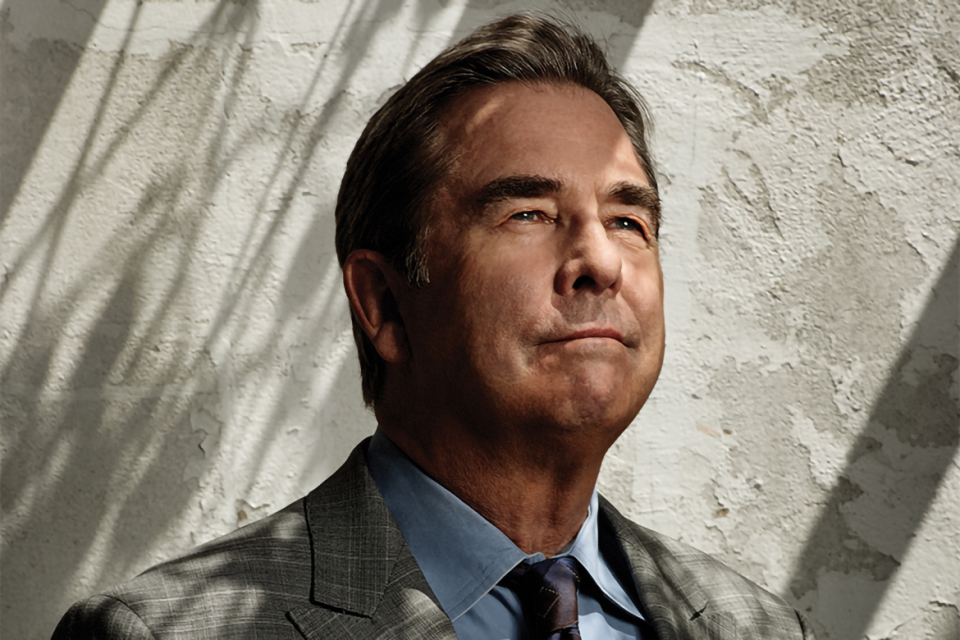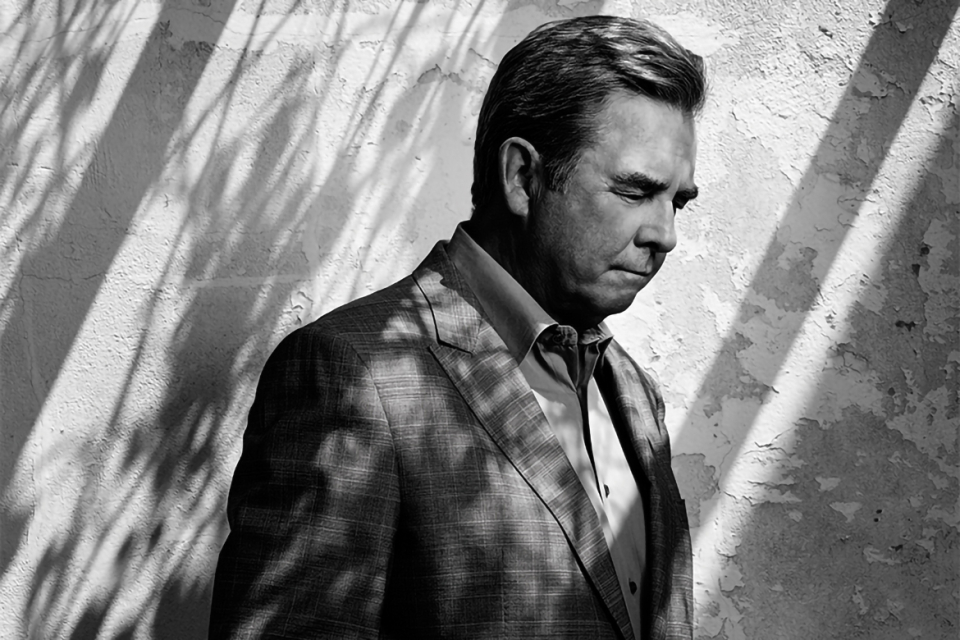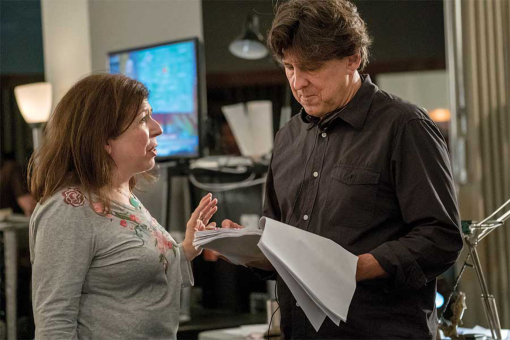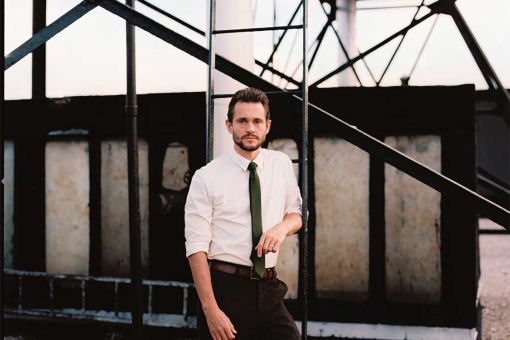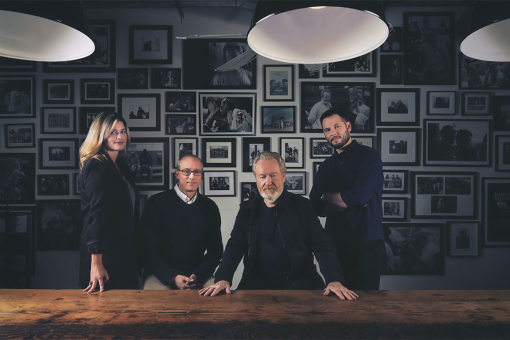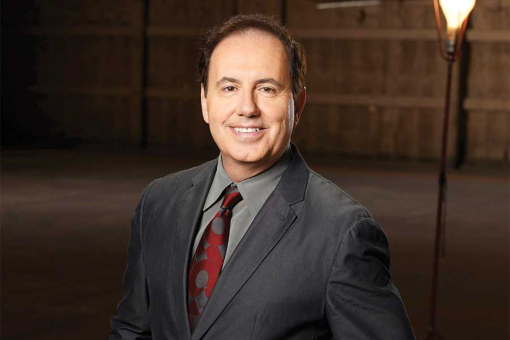Natural storyteller that he is, Beau Bridges enjoys explaining how and when he learned that the character he plays on Masters of Sex is gay.
He didn’t know when he appeared in the pilot as barton Scully, fictional provost of the university teaching hospital where real-life sex researchers William Masters and Virginia Johnson did their pioneering studies. Nor did viewers, as they watched the first hour of Showtime’s provocative, critically acclaimed drama.
Bridges was a busy guy then, as he typically is. He was starring on Broadway in a revival of the Abe Burrows-Frank Loesser musical How to Succeed in Business Without Really Trying. Masters of Sex was just another pilot.
It wasn't until a party in Manhattan, thrown to celebrate the series' pickup, that he learned his character has a secret in the '50s-era drama.
"My wife and I went to the party, and the producers were patting me on the back, saying, 'We're so happy to have you on the show. You're such a good actor.' I was getting all puffed up. Then Michelle [Ashford] said, 'We have a really interesting twist for your character.'
"Immediately I'm thinking — well, I'm the provost of this university where all kinds of crazy sexual things are happening, so I'm probably getting it on with all these young women. So I perked up and said, 'Oh? What is it?' And Michelle said, 'You're gay.'"
"It was a great moment, because he was so completely shocked," remembers Ashford, the show's creator-executive producer. "He said, 'Oh, man. Whoa!' But then he got completely behind it. It turned out to be the perfect pairing of an actor with a role."
It wasn't Bridges's first professional foray along the complex spectrum of sexuality. He's twice portrayed transsexuals: in the play Looking for Normal at L.A.'s Geffen Playhouse, and again on TNT's The Closer, where he played a detective who's undergone gender reassignment surgery.
"That's different than being gay," Bridges notes. "Totally different. So what jumped out at me about this role was the chance to really represent that experience during that era — what it was like, how you were treated.
"For a man in a position of power, like Barton, it would have been devastating for his career if anyone found out. Which seems nuts today, but it's still an issue.
"My kids have gay friends, people in their 20s and 30s, who still have not come out to their parents, or who are successful in show business but are afraid to come out. For that reason, I really appreciate the opportunity to represent that."
Remarkably, the relationship between Barton and his intimacy-starved wife, Margaret (Allison Janney), who's in the dark about his secret until well into the first season, has emerged as perhaps the deepest and truest love story in the series. From Margaret's anguish to Barton's torment, the couple has had no shortage of heart-rending scenes. Yet they've stood by each other, even as the life they knew collapses.
"It's so much deeper than the usual stuff," Bridges says of the feelings they excavate in the wreckage. Adds Ashford: "It's an interesting way to explore what a marriage really is, and in season three [due July 12] we're going to explore that even more."
It can be startling to realize how deeply embedded Bridges is in the history of television and movies.
To reach his dressing room on the CBS Redford lot in Studio City - where his recent sitcom The Millers was taped - visitors follow a sidewalk etched with the titles of some of the lot’s earliest productions, including 1949's The Red Pony, in which Bridges was briefly seen at age seven, along with Robert Mitchum and Myrna Loy, the seminal TV series Gunsmoke, in which he appeared as a young actor, filmed on the same stage as The Millers.
His father's early-'60s anthology series, The Lloyd Bridges Show, was shot on stage nine where he appeared in a couple of episodes, including one directed by John Cassavetes, then an unknown doing his second paid gig.
"I take a walk around this lot before every show," Bridges says, "and I can hear all these echoes of people who are gone now."
At 73, he's very much still here, with a flourishing career. When he found himself a regular on two new episodic series at once — The Millers, the CBS multi-cam comedy created by Greg Garcia, in which he starred opposite Margo Martindale and Will Arnett, and the hour-long Masters of Sex, which shoots on the Sony lot in Culver City — accommodations had to be made.
"Fortunately, CBS and Showtime are under the same corporate umbrella, so they worked it out," Bridges says.
He appeared in only two Masters of Sex episodes in the show's second season (the first and the finale). Following the November cancellation of The Millers, however, viewers will see more of him on the Showtime drama. Notes Ashford (whose fellow exec producers are Carl Beverly, Sarah Timberman, Amy Lippman and Judith Verno): "He'll be with us for the duration now."
Bridges continues to challenge himself by working in many mediums. A 2009 appearance in the musical Guys and Dolls at the Hollywood Bowl paved the way for his Broadway musical debut, in How to Succeed. That led to the Masters of Sex pilot, which was shooting in New York.
Taking on a song-and-dance role on Broadway in the seventh decade of life is no cakewalk, he reports. Vigorous workouts with his daughter Emily, a Pilates instructor, helped condition him physically. But nothing about Bridges suggests he's slowing down; even his recent TV characters, including newly divorced Frank Miller, still have active sexual lives. "Why not?" he says. "Old people get it on, too."
Next to his taller, square-jawed brother Jeff, who's starred in movies ranging from The Last Picture Show to The Big Lebowski and Crazy Heart, Bridges hasn't been a sex symbol — a difference exaggerated to near-comic effect when they portrayed piano-playing brothers in the 1989 movie The Fabulous Baker Boys. Beau played the balding, pragmatic family man against Jeff's drifting, smokin'-hot artiste.
Still, Bridges had a certain California cool when he came of age in the late 1960s and early 70s: he was both clean-cut and casual, with floppy blond hair and warm blue eyes. In the hit 1975 movie The Other Side of the Mountain, he played a hot-shot athlete who wins the heart of skier Jill Kinmont.
Earlier, starring in director Hal Ashby's 1970 film The Landlord, Bridges found himself shooting on location in Bedford-Stuyvesant, a New York City neighborhood that had seen riots during the '60s. Racial tensions were running high; an assistant director had recently been shot during the filming of Cotton Comes to Harlem.
Bridges remembers a harrowing moment from his first day: "I was afraid, because of what had happened before, and I park in front of this tenement and see all these people on the rooftop yelling racial stuff at me." (It didn't help that he was wearing a white suit, in character as a landlord bent on kicking low-income tenants out of his building.)
"At one point, I had to walk down the street by myself, and I heard all these people yelling, 'Get that white motherf—ker,' and I just knew I was gonna go down.
"Then I felt this big arm come around me, and it was one of the actors, Lou Gossett. He starts talking to me — 'Are you a Laker fan? I heard you played a little ball in college.'" (Indeed, Bridges had been on the UCLA basketball team.) "I realized that he was saying to these other people, 'If you wanna take this guy out, you're gonna have to go through me.'
"And that's family right there. Actors are a crazy bunch — we'd go to war for each other. We'd die for each other. You don't want to mess with someone unless you want to face the whole family."
This reminds him of something his father told him when he first entered the business: "He said, 'You're going to find that you're joining a whole new family. You're going to join the family of actors.'"
Family is a big theme in Bridges’s life. He has five children, including four with wife Wendy Treece, and he’s constantly pulling them into his projects. In turn, he credits younger brother Jeff for helping him through a career lull.
"He'd gotten that script for Baker Boys, and he said, 'I want you to play my brother.' Jeff's career had really taken off, and I said, 'They're not gonna cast me — they're gonna go after someone who's flying high, like you are.' And Jeff said, 'You're gonna play this — go meet Steve [Kloves, the writer-director]."
Of course, the older Bridges did get the part, and the picture — for which Michelle Pfeiffer earned an Oscar nomination — was a high point for all three performers.
"That movie helped me a lot," Bridges says. "And right after that, I got Without Warning: The James Brady Story."
Bridges had the title role in that 1991 HBO movie. Written by Robert Bolt, it focused on the rehabilitation of James Brady, who, as White House press secretary, had taken a bullet in the brain during an assassination attempt on President Ronald Reagan. Bridges's performance won him both a Golden Globe and the first of three Emmy Awards; he's been nominated 15 times, most recently for Masters of Sex.
Still, when he reflects on his career, "what stands out for me is not the awards or recognition," he says. "It's the people I met and knew and grew to love. James Brady [who died last August] was a great guy, and we became good buddies. He was so smart and had such a strong will and a loving heart. His wife Sarah, who had to stand tough through all of that, was just magnificent,
"So for me, it's the way this work we do as storytellers connects you to the spiritual side — and puts you in touch with some true things about life — that is most rewarding."
Television, of course, has its vicissitudes. "One of my favorite series I ever did was [ABC's] Maximum Bob, based on an Elmore Leonard character who was a judge," Bridges says. "I loved that show, and it got great reviews. But it went nowhere. I've found that as an actor, you can't get wrapped up in all that. Just come in and do the best work you can, and let the rest of it play out, because it's crazy what happens. I feel blessed to have any kind of longevity in this business."
In the season-two opener of Masters of Sex, Bridges delivers perhaps his most harrowing performance, as a desperate Scully trying shock treatments to eliminate his homosexuality. When that doesn't work, he attempts suicide.
In between, there's a particularly emotional scene in which he attempts to make love with his wife, but things go badly. "It's so painful to watch," Ashford says, "because they love each other and want it to work, but it just can't. As actors, they bring such honesty to it."
"Even as the head of a hospital, he's willing to do this amount of self-harm, because he's so in love with his wife and thinks it's what she wants," Bridges observes. "But she tells him, 'Don't do it [the shock treatments], because I love you and I don't want you to harm yourself.' So it's really quite beautiful, because they come to the realization that they're there for each other in a deeper way."
The couple will apparently be separated when the story resumes in season three; as noted in the season-two finale, Masters (Michael Sheen) has left the teaching hospital, and Barton no longer works there. Even so, the men will resume their friendship, Ashford says.
"First of all, Barton is a great character for Masters to bounce off of, and second, it lets us delve into the work Masters and Johnson did on homosexuality, which is a fascinating and important part of their legacy." Janney will also be back. "In season three, we'll find out what happens with them in the next phase of their lives," the producer promises.
As for what Bridges brings to the role — an amalgam of several real-life mentors of Bill Masters — Ashford says: "He brings a profound humanity, which is very true to Beau. Especially for a man who grew up in Hollywood, and surrounded by it, he's so centered and kind. He's really such a good soul."
Photographs by Scott Council

